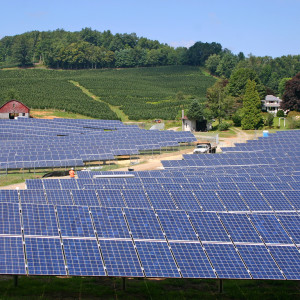Americans think about national security in terms of what is routinely captured in major news headlines: North Korea, ISIS, Russian election meddling and more. While important, our country’s national security is defined by much more than a handful of big-ticket threats. U.S. national security relies on a complex and interdependent mosaic of factors, some of which are not normally associated with national security, but in reality play an important role in augmenting our nation’s strength.
One example is solar energy, which has risen to become a key element in our country’s energy security portfolio — at a time when its future viability has come under attack from within the solar industry itself.
America is stronger when it can count on its own energy sources, and solar is gradually playing a bigger role in our nation’s energy mix. Solar energy’s importance to U.S. national security stems most directly from the critical role it now plays in providing energy to far-flung military bases throughout the United States and abroad.
The military is the single largest consumer of energy in the United States. Clean, stable energy sources remain a priority to the Department of Defense, which prizes secure and affordable energy resources to power its military installations and other facilities. Unplanned power outages can quickly curtail the effectiveness of those facilities, making alternatives to dependence on the traditional energy grid critically important to Defense operations.
On the strength of its affordability and ready availability, large-scale solar photovoltaic systems now provide a welcome stream of energy at military facilities across the country, shielding them from outages on the grid. Those disruptions are no small matter— last year the Defense Department reported more than 700 outages related to commercial utility services, many resulting from loss of electricity. Solar and other renewable power sources provide a needed back-up plan for mission-critical activity.
Unfortunately, solar’s role as a go-to option for the military may soon be curtailed due to the actions of two bankrupt, foreign-owned solar manufacturers. The companies filed a Section 201 trade petition asking the U.S. government to shield them from import competition by placing tariffs and/or quotas on foreign-made cells and modules, the component parts of solar panels.
The request by the two companies would send solar prices through the roof, effectively leaving it unable to compete with other forms of energy. Analysts believe that the growing industry, which now employs roughly 260,000 U.S. workers, will shed 80,000 jobs if tariffs are imposed. This would almost exclusively benefit the two foreign-owned companies — controlled by China and Qatar — neither of which has U.S. national security interests at heart.
This scenario is detrimental to everyone involved. American national security is not just about the readiness of its military. Our country’s ability to cultivate a wide variety of stable energy sources enhances our energy security, which is critical to our long-term economic viability. Making solar energy uncompetitive through artificial trade barriers wouldn’t just erode a welcome new resource advantage at our military bases but it would needlessly remove a quiver from our nation’s broader energy portfolio.
There is simply no good reason to undermine willfully America’s efforts to reduce dependence on foreign energy sources, as I well know.
As a 26-year Navy veteran, I served as a Surface Warfare Officer on five ships, including guided missile cruisers and destroyers, to protect U.S. national security interests across the globe. Foremost among those missions was to safeguard the sea-lanes of communications that facilitate the global economy, including the flow of oil to and from the United States.
I have experienced firsthand — particularly during my command of the USS Cole when it was attacked by al-Qaeda terrorists — the real-world implications of the term “energy security” when our nation’s forward-deployed assets are placed in harm’s way to safeguard a reliable and affordable supply of energy for U.S. consumers and our economy.
President Trump will soon be reviewing recommendations on whether to impose trade barriers on imported solar components. I urge the president to keep the long-term view of our country’s security in mind. The military benefits from a healthy solar industry, as does the rest of our country. There is simply no good reason to squander the potential of a promising new energy advantage.

